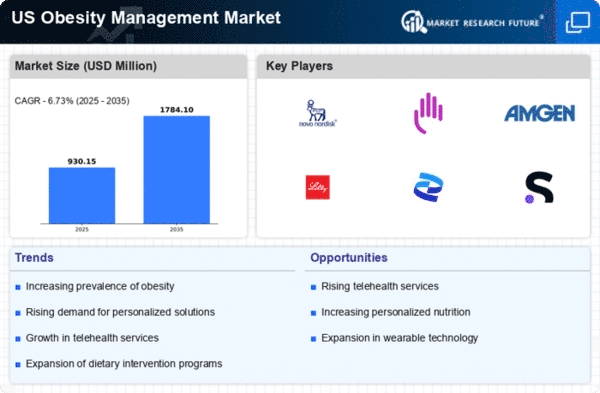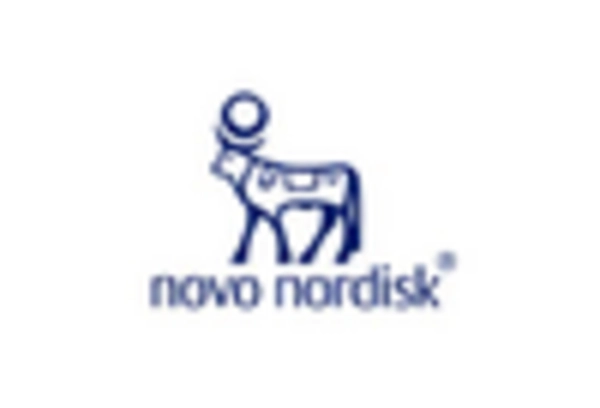Rising Healthcare Costs
The escalating costs associated with obesity-related health issues are a critical driver of the obesity management market. In the US, obesity-related medical expenses are estimated to exceed $147 billion annually, placing a substantial burden on the healthcare system. This financial strain has prompted healthcare providers and insurers to prioritize obesity management as a means of reducing long-term costs. Consequently, there is a growing emphasis on preventive measures and effective treatment options within the obesity management market. As stakeholders recognize the economic implications of obesity, investments in innovative management solutions are likely to increase, fostering a more dynamic market environment.
Increasing Obesity Rates
The obesity management market is significantly influenced by the rising rates of obesity in the US. Recent data indicates that approximately 42.4% of adults were classified as obese in 2017-2018, a figure that has likely increased in subsequent years. This alarming trend necessitates effective management strategies, driving demand for various obesity management solutions. The increasing prevalence of obesity-related health conditions, such as diabetes and cardiovascular diseases, further emphasizes the need for comprehensive obesity management programs. As healthcare providers and policymakers recognize the urgency of addressing this public health crisis, investments in obesity management market initiatives are expected to grow, potentially leading to a more robust market landscape in the coming years.
Advancements in Medical Treatments
Innovations in medical treatments for obesity are reshaping the obesity management market. The development of new pharmacological agents and surgical interventions has expanded the options available for individuals struggling with obesity. For instance, recent advancements in bariatric surgery techniques have improved patient outcomes and reduced recovery times. Additionally, the introduction of novel weight-loss medications has provided healthcare professionals with more tools to address obesity effectively. As these medical treatments gain acceptance and demonstrate efficacy, they are likely to attract more patients seeking solutions, thereby propelling growth in the obesity management market. The increasing focus on personalized medicine may also enhance treatment effectiveness, further stimulating market expansion.
Government Initiatives and Policies
Government initiatives aimed at combating obesity are playing a pivotal role in shaping the obesity management market. Various federal and state programs are being implemented to promote healthier lifestyles and improve access to obesity management resources. For example, initiatives that encourage physical activity and better nutrition are gaining traction, potentially leading to increased demand for obesity management services. Furthermore, policies that support research and development in obesity treatments may enhance the market landscape. As these government efforts continue to evolve, they are expected to create a more favorable environment for the obesity management market, encouraging innovation and accessibility.
Growing Awareness of Health and Wellness
The increasing awareness of health and wellness among the US population is significantly impacting the obesity management market. As individuals become more informed about the risks associated with obesity, there is a heightened demand for effective management solutions. This trend is reflected in the growing popularity of weight loss programs, fitness regimes, and nutritional counseling services. Additionally, the rise of social media and digital platforms has facilitated the dissemination of information regarding obesity management, further driving consumer interest. As awareness continues to expand, the obesity management market is likely to experience sustained growth, with more individuals seeking out resources to achieve and maintain a healthy weight.
















